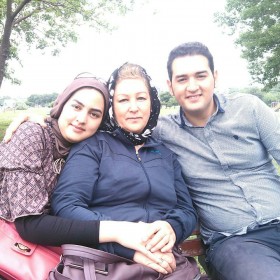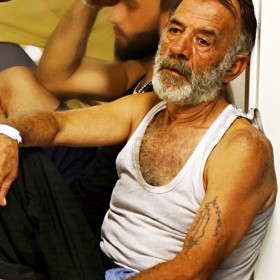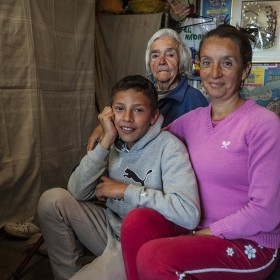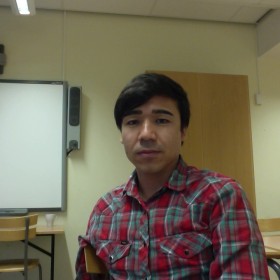AA Gill: Long day’s journey into night

The White Desert: AA Gill at the Zaatari camp, where more than 100,000 Syrian refugees live in white tents set on white gravel.
Brigadier General Hussein Zyoud settles himself into a chair. Fretting and plaiting his fingers, he needs a smoke. The lugubrious face sags around a drooping military moustache, the go-get-’em camouflage stands out incongruously in his large office with new multiple flat screens for PowerPoint presentations and CCTV. There are a lot of chairs: for his photographer who records his every handshake, for my photographer, for his translator and my translator and various aides and minders and staff officers. The General is the custodian of Jordan’s borders, and the responsibility of standing on the edge of chaos without a cigarette weighs on his broad epaulettes. He does this a lot — meeting people. He’s a popular man with factfinders and international committees. There are hotel-reception flower arrangements and bright flags of the sort young men are supposed to die for. One boasts a large peregrine’s head with a map of Jordan in its eye. The kingdom’s awkward outline is the reason we all come here: this semidetached nation is surrounded by the neighbours from half a dozen heretical hells: Israel, Syria, Iraq, Saudi Arabia and a watery sliver of Egypt. A waiter serves cups of coffee; the General apitulates, and fires up a ciggie. Jordan’s borders leak refugees. Throughout the nation’s short history after its duplicitous colonial creation in 1946, it has taken in next door’s unwanted castoffs: millions of Palestinians in the 1950s, ’60s and ’70s, then Iraqis, and now Syrians, who are, even by this ’hood’s high standards, fleeing a peerlessly vicious and indiscriminately vile war. As I write, more than a million of them have left the country to claim thin and desperate sanctuary. I ask the General why he has kept the border open. He shrugs. “It is our history, we take in refugees. It’s what we do. I will show you. I will show you everything. You can go wherever you like, to understand. ”Not only has Jordan kept its border open, but its army actively helps refugees. No other state’s armed forces does what the Jordanians are now doing for their neighbours — and nobody dares calculate how much they might be risking by being the Middle East’s good Samaritan. As we leave the office for his 4×4 with a flag on the front, the General pauses: “We had your Prime Minister Cameron here, you know? I have a photograph.” And there’s the PM sporting his best jut-jawed Dave of Arabia face. Jordan is an arid country, but as we drive north it turns into beautiful rolling green farmland, olive groves and grazing. In the late afternoon light it looks like a Victorian academy painting of an idyllic Holy Land, with the addition of countless black plastic bags. An oily pall of smoke smudges the horizon. We stop to admire a tourist’s view of the border, and the General points out that we can see threecountries from here: Syria, Israel and Lebanon; over there is the Golan Heights. It’s tranquil, but the hot air carries low thuds, like heads hitting carpet. Mortars. “They are coming. They are beginning to cross,” says the General. “Do you want to see? Perhaps it’s more dangerous.” The United Nations High Commission for Refugees has warned us that the official danger level for the border has risen to five. Tom, the photographer, points out that this doesn’t mean much unless you know what it can go up to: is it like Spinal Tap and goes up to 11? “No, it’s five out of five,” says the UN official, with a tightly thin smile, and: “Could you please sign these waivers?” It is, just for this moment, the most hazardous border in the world. As the light dies we turn onto a rocky track through olive trees and halt in a narrow valley: on one side, a sloping hill; on the other, broken land. The car lights are extinguished and we stand in the blue shadows and cooling dust. “That is the border,” says the General. I stare at the distance. “No, no, here. Here in front of you.” The track peters out and half a dozen steps away is Syria: dirt, rock and shrubs that crumple into night. And then, as I watch, figures appear out of the darkness. It’s a shock, I hadn’t believed we’d see anything but, bent double under sacks and stumbling across the uneven ground, men and women clutching small children and the flotsam of their lives heave with the scuff and grunt and sighs of folk who are trying to hurry silently in fear. Families hold hands, they move past us like heavy ghosts, not looking to the left or right. Among them now are Jordanian soldiers in full combat gear, helmets and body armour strapped tight, with automatic weapons. In front of them is a long, steep hill; on the far side, in its protective lee, is a makeshift reception centre. This is the last leg of one of the most dangerous journeys on Earth. The bare slope faces Syria: it has no cover, just pale scree. At the summit there are already silhouettes on the skyline, moving like a drunken conga, a dance of death against the star-bright sky. I watch for an astonished minute as the flow of refugees rising out of the night increases from a trickle to a migration — they’ll have waited for the veil of darkness to make for this invisible line in the sand. The sound of not-so-distant artillery goads them forward. A woman struggles past me tugging a child — a girl in sandals, little more than a toddler. The mother wrestles a suitcase that swings like a pendulum, and in her other hand she has a large bag. I take the bag from her; she lets go without a murmur or a glance. The soldiers all carry luggage or a child, everybody shares the weight — the General, the translators, Tom, the fixers, the minders and the staff officers, we all grab something and together we struggle up the moonlit hill. This bag is heavier than any case I’ve packed since my school trunk. The handles cut myhand, the weight wrenches my shoulder. The summit recedes, the ground is uneven and rolls underfoot. I can’t possibly put the bag down or hand it back. This woman has carried it for so long, along with the weight of her responsibility and circumstances. So I crab behind her, arms numb. The skyline remains stubbornly distant, the back of my neck prickles as the ordnance rumbles, and then finally, finally, we’re there. I look back down at Syria, malevolent in the moonlight. On the other side, below us, is a hurried and huddled collection of Portakabins and tents, and the hum of a generator. I drop the bag beside the exhausted mother and her hollow-eyed child and attempt an insouciant smile. She nods. Hala, my interpreter passes, hugging a suitcase. “Can you ask this lady what she’s got in the bag?” There’s a short exchange. “Oil, cooking oil.” She’s lugged a gallon of olive oil from Syria to Jordan, the world’s 13thbiggest olive-producer. I don’t say that aloud, I just wish her and her daughter luck: “Inshallah.” We have all wondered what we would rescue from the burning house. Photo albums, the jewellery box, a Damien Hirst drawing. What people whose houses really are on fire or blown up take are blankets and shoes and cooking pots and radios and the tools of their trade and their papers—deeds, licences, the proof of who they are or were—and mobile phones. Nobody trains you to be a refugee, there are no helpful government pamphlets.
These new born refugees are learning as they go ; as they sit in family groups there is no sense of joy or even relief, just an exhausted, subdued misery. Tolstoy pointed out that all happy families are alike, but every unhappy family is unhappy in its own way. He was wrong. There is a terrible, bland sameness in despair. Their stories are told in a repetitive monotone, almost banal in their sadness. “My grocery shop was crushed by a tank. We have no where to live. Our house was blown up with a bomb. My family’s in prison. My husband is dead. I don’t know where my brothers are. We were forced to leave. We have nothing. Everything is lost. There is no water. There is no food. There is no help. There is no hope.” There are a few tears, no histrionics, precious little anger, and there’s no “making the best of it”, no community singing — this is way, way beyond any Blitz spirit—just a blinking, passive capitulation as the tireless Jordanian soldiers move among them handing out clean water, cartoons of juice for children, and biscuits, and their own rations – the officers have trouble getting their men to eat. And there’s no gratitude. This isn’t a salvation, it’s not a new start, it’s not a lucky escape when a man, a widow, a family, a village are forced to make the choice to be refugees. It is an unconditional surrender, not just of the house you live in or your profession, but of your security, community, your web of friendships, your dignity, your respect, your history and your future—not just yours, your children’s future. The middle-aged man is never going to get his grocery shop back; the mechanic is never going to return to servicing Mercedes. A bowed gent stands exhausted with three daughters in the queue to register. How old are they? “This one is four, this one 12 and this one six.” In a whisper, he adds the school years they were in. Earlier, a Palestinian told me that the refugees may think they’ll go back in six months, or a year or two. They all bring their house keys. He added: “I still have the keys my parents brought from Palestine. There are no more doors left to open.” An ancient woman bent almost in half and shrouded in black is helped by two boys, her grand children. They forced her to leave their house. She fought them, she wanted to die where she’d lived, but she was the last person left in the village. They say she is 100 years old, older than the country she’s been forced to flee. At the edge of the little reception camp is a hut on stilts, the size of a potting shed, decorated incongruously with peeling wall paper patterned with butterflies. A soldier in helmet and flakjacket looks at a black-and-white television screen plugged in to a geeky box. He has a little joy stick and a series of buttons. Behind him is a rough, hand-drawn map of the border. This is the night-sight camera post, panning over Syria. As clear as day we can see an army camp, men walking about, a road with cars, a tank emplacement—and here are refugees dodging down the last track. We look. “Look,” says the soldier as he zooms in on a small hill. At its crest there are two dark dots. “Ambush.” A pair of snipers. “How far away?” I ask.“Close,” he replies matter-of-factly. This night there are a handful who have made it across with bullet wounds; they are taken away by ambulance. The rest of the refugees are put on buses that glow magically in the desert like mystery tours. They should be used by the army to take soldiers on leave, but every day the military gives up 450 vehicles to the refugees. On board, the passengers sit in an exhausted stupor, children flop across adults, nobody asks if we’re nearly there yet. It’s getting late and cold as the dusty luggage is stuffed on board. Something is pushed in to my hand. A child has given me a wilting posy of white wild flowers; her mother beside her is the woman whose oil I carried. She says, “For you, a piece of Syria,” and they get on the bus that bumps its way down the track back into the night. The refugees don’t think the Zaatari camp is in Jordan at all, they talk about Jordan as out there somewhere. This is a limbo, an un place, as detailed animage of purgatory as you are likely to find on this Earth. It has about it an ethereal whiteness: the UN tents and pre fab huts are white, the sky is white and the ground it all sits on is white. The Jordanian government offered a lump of desert to keep the refugees, but it was so dusty that it posed a s serious respiratory – health risk, so the UNCHR imported tonnes and tonnes of white gravel to lay on the sand. People are reduced to ants on this vast, pale sheet, a dystopian science-fiction set holding more than100,000 souls—the population of Blackburn or Exeter—70% of them women and children. The logistics of building it in a number of weeks are numbing, and there is no water—Jordan is chronically parched. Imagine the sanitary needs of 100,000 people. Try to imagine the condition of the Portaloos— they make Glastonbury look like The Ritz. The Jordanian police won’t patrol the camps, it’s too dangerous. Military gendarmes lounge at the perimeter in armoured cars in case of serious trouble—there are sporadic riots. People can’t come and go; there is a perimeter fence and security supplied, worryingly, byG4S. It isn’t a prison as such, but desperation, utter poverty and powerlessness make de facto prisoners of the refugees, particularly the women.

benighted land: A A Gill looks over to Syria with General Zyoud from a hill top in north Jordan. Every night, hundreds of refugees cross this border under cover of darkness.
She arrived three days ago with four children under 12, she has no husband, she has no extended family, and here she begins to weep
The cost so far for Jordan is over £465m; contributions from other countries amount to £140m. The UNHCR calculates that it needs half a billion dollars to run the camp and look after the Syrian refugees, and that will have to come from donations. But the half billion will only keep the camp going until June. This is a Herculean undertaking, like a space programme in the desert, and there are 14,000 new arrivals every week. The UNCHR offices are a series of Portakabins cordoned off at the edge of the camp, surrounded by an angry clamour of supplicants. A woman presses against the wire gate. Two small children cling to her chador, and she is alternately begging and demanding from the G4S guard. Finally, someone pulls her inside, the children like limpets. She’s taken to an office where veiled women interview her. She arrived three days ago with four children under 12, she has no husband, she has no extended family, and here she begins to weep. They are alone; the children press against her like bookends, and she says she is also six months pregnant and doesn’t want to have her baby here, in the white desert. She draws a deep breath, angrily wipes her eyes and whispers: “I am humiliated.” Anger blooms in the camp, domestic violence rages as men bereft of respect take it out on their wives and children. A man came in to the UNHCR demanding that they do something for his wife —make-up, hair, better clothes—because she was becoming unattractive and he didn’t want to have to divorce her. The staff gave him short shrift. Others have asked for another tent so they can have a sex life away from their children. The staff say there are more important things to be concerned with, but privately they agree that, if it is your sex life, there probably isn’t. There are also reports of daughters being married off to men who have money or access to outside, who might be guides for the family to a new life. If they ’remarried, they’re somebody else’s responsibility, and it is also protection against the stigma of rape. There are short-term marriage contracts, a sort of Madam Butterfly prostitution, usually involving older women or desperate widows. The camp is prey to gangs, to politics and vendetta. It feeds liverishly on boredom. Children go feral: there is nothing for them to do, no trees to climb. A refugee camp is a community with everything good and hopeful and comforting about community taken out. There is precious little peace, no belonging, no civic pride. There is, though, still the gossamer web of human kindness. Villagers who left Syria together collect together to form protective huddles; in one kitchen block, a group of women who have known each other all their lives cook rice, aubergine and a little fried chicken. The smell is wonderful after the camp. They tease me, confident in their togetherness. Outside, a man beckons me to his tent. He has a generator and is charging mobile phones; it is a little business. He asks me in. He’s a big man in a cloth cap and he pushes me hard. I fall through the door and his wife laughs. He says he’s a communist and “in our village we buried the last illiterate person in 1974. Now, look”, his voice rises. “These children. Will they ever read and write? We are going backwards.” He offers me coffee, insists with anger, insists. To him, hospitality is more than a politeness, it is a hold on the last threads of dignity and self-respect. It is important to accept it from people who have nothing. People give us things all the time, sweets, advice, good wishes, smiles, lectures. There are street stalls where you can buy expensive smuggled goods from underpants to microwaves— Syrians are famous entrepreneurs —and even somebody making vivid pink candy floss in this desperate desert. We watch a boy shimmy up an electricity pylon and gingerly attach wires to steal power. Men gather and wave their arms and look at the white sky. They want Scuds to come and kill Assad. “Where is Nato?” someone shouts in my face. “Where is your Nato? It is because we are Muslim they don’t come. In Europe you treat animals better than we are treated here.” Refugees are the collateral damage of wars, they are the pieces that have been taken off the board. The hot news story is the conflict itself; this intransigent, complex headache of unwanted, awkward, lumpen people doesn’t have the dynamic interest of global politics or the screen-grab of smoke and bodies and Kalashnikovs. Whatever the outcome in Syria, these people have already lost, lost everything but despair and a gut-churning sense of injustice that will fester. Lacking power or influence, swept aside by events that were not of their making, they will slowly turn to dust, go from unconsidered to unremembered, their grief evaporating in a region where every handful of dirt is someone else’s calamity.

into the unknown: Syrian children uprooted by civil war may never return to their homeland, if their fate follows that of the Palestinian and Iraqi refugees who fled to Jordan.
“Remember Deir Ba’alba. Please, it’s important. Remember Deir Ba’alba.
In Amman, Jordan’s capital, old Iraqi men smoke hubble-bubbles and play cards. They were much younger men, with futures and hopes and aspirations, when they dealt the first hands here. They are served by Palestinian waiters who have never seen their homeland. In the camp, a small boy in a red tracksuit is trying to find medical help; he needs a shot for his asthma. His father comes over and says he saw us last night on the border. He starts to tell the story of his village, Deir Ba’alba. “It was surrounded, burnt and shelled for months. The people couldn’t escape and it was destroyed and everyone was killed. The whole village.” He comes to a ragged stop as he tries not to weep in front of foreigners and his surviving child and his dignity. “Remember Deir Ba’alba. Please, it’s important. Remember Deir Ba’alba.” A refugee camp reminds you, if you need reminding, that you are your brother’s keeper, but he is heavy. So perhaps you might remember Deir Ba’alba. I only wrote it down phonetically, so say it out loud to someone else. Written by A. A. Gill Photographs by Tom Craig Originally published in the Sunday Times.











